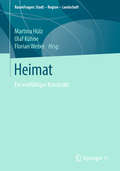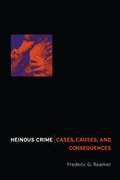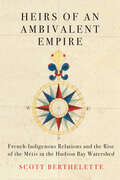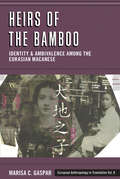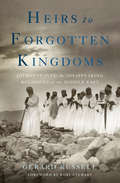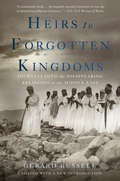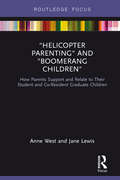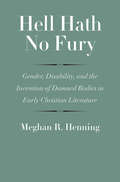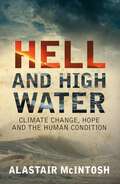- Table View
- List View
Heimat: Ein vielfältiges Konstrukt (RaumFragen: Stadt – Region – Landschaft)
by Olaf Kühne Florian Weber Martina HülzDie politischen und gesellschaftlichen Diskussionen um Heimat intensivieren sich. Im Kontext des Versuchs der Selbstvergewisserung im Zuge der Globalisierung, aber auch der Differenzierung und Fragmentierung der Gesellschaft, der Einwanderung sowie landschaftlichen Wandlungsprozessen nehmen die Kämpfe um Deutungshoheit um das Heimatliche und das Nicht-Heimatliche an Schärfe zu. Mit dem Band ‚Heimat. Ein vielfältiges Konstrukt‘ soll ein Beitrag eigens aus raum-, politik- und medienwissenschaftlichen sowie soziologischen Perspektiven zur Klärung und Einordnung unterschiedlicher Positionen im Kontext des ‚umkämpften Feldes Heimat‘ geleistet werden.
Heinous Crime: Cases, Causes, and Consequences
by Reamer Frederic G.What circumstances lead someone to commit murder, rape, or acts of child molestation? Why does society have such a deep-seated wish for vengeance against perpetrators of heinous crimes? Can those found guilty of such crimes ever be rehabilitated? Officials of the criminal justice system, politicians, and ordinary citizens argue about possible solutions to these controversial and vital questions, with little agreement. This book offers innovative perspectives on the difficult issues concerning a civilized society's response to offenders guilty of heinous crimes.
Heinrich Himmler: A Detailed History of His Offices, Commands, and Organizations in Nazi Germany
by Rolf MichaelisAll of Heinrich Himmler&’s roles and official positions are described in detail
Heiresses: The Lives of the Million Dollar Babies
by Laura ThompsonNew York Times bestselling author Laura Thompson returns with Heiresses, a fascinating look at the lives of heiresses throughout history and the often tragic truth beneath the gilded surface.Heiresses: surely they are among the luckiest women on earth. Are they not to be envied, with their private jets and Chanel wardrobes and endless funds? Yet all too often those gilded lives have been beset with trauma and despair. Before the 20th century a wife’s inheritance was the property of her husband, making her vulnerable to kidnap, forced marriages, even confinement in an asylum. And in modern times, heiresses fell victim to fortune-hunters who squandered their millions.Heiresses tells the stories of these million dollar babies: Mary Davies, who inherited London’s most valuable real estate, and was bartered from the age of twelve; Consuelo Vanderbilt, the original American “Dollar Heiress”, forced into a loveless marriage; Barbara Hutton, the Woolworth heiress who married seven times and died almost penniless; and Patty Hearst, heiress to a newspaper fortune who was arrested for terrorism. However, there are also stories of independence and achievement: Angela Burdett-Coutts, who became one of the greatest philanthropists of Victorian England; Nancy Cunard, who lived off her mother's fortune and became a pioneer of the civil rights movement; and Daisy Fellowes, elegant linchpin of interwar high society and noted fashion editor.Heiresses is about the lives of the rich, who—as F. Scott Fitzgerald said—are ‘different’. But it is also a bigger story about how all women fought their way to equality, and sometimes even found autonomy and fulfillment.
Heirs of an Ambivalent Empire: French-Indigenous Relations and the Rise of the Métis in the Hudson Bay Watershed (McGill-Queen's Studies in Early Canada / Avant le Canada)
by Scott BertheletteThe fur trade was the heart of the French empire in early North America. The French-Canadian (Canadien) men who traversed the vast hinterlands of the Hudson Bay watershed, trading for furs from Indigenous trappers and hunters, were its cornerstone.Though the Canadiens worked for French colonial authorities, they were not unwavering agents of imperial power. Increasingly they found themselves between two worlds as they built relationships with Indigenous communities, sometimes joining them through adoption or marriage, raising families of their own. The result was an ambivalent empire that grew in fits and starts. It was guided by imperfect information, built upon a contested Indigenous borderland, fragmented by local interests, and periodically neglected by government administrators. Heirs of an Ambivalent Empire explores the lives of the Canadiens who used family and kinship ties to navigate between sovereign Indigenous nations and the French colonial government from the early 1660s to the 1780s.Acting as cultural intermediaries, the Canadiens made it possible for France to extend its presence into northwest North America. Over time, however, their uncertain relationships with the French colonial state splintered imperial authority, leading to an outcome that few could have foreseen – the emergence of a new Indigenous culture, language, people, and nation: the Métis.
Heirs of the Bamboo: Identity and Ambivalence among the Eurasian Macanese (European Anthropology in Translation #8)
by Marisa C. GasparThe reintegration of Macao into the People’s Republic of China in 1999 transformed Macao into one of the gambling capitals of the world and was accompanied by unprecedented social changes that, ultimately, have redefined the Macanese identity. This book is about the Macanese living in Portugal and their intimate social networks in loco and interactions with their counterparts in Macao and elsewhere in the diaspora, by the use of Internet. Memory and ambivalence, deeply associated with kinship, language, food and heritage, are the cornerstones of this research, which overturns colonial stereotypes and concepts of Macanese cultural purity.
Heirs of the Greek Catastrophe: The Social Life of Asia Minor Refugees in Piraeus
by Renée Hirschon PhilippakisHeirs of the Greek Catastrophe is a landmark work in the areas of anthropology and migration studies. Since its first publication in 1989, this classic study has remained in demand. The third edition is published to mark the centenary of the 1923 Lausanne Convention which led to the movement of some 1.5 million persons between Greece and Turkey at the conclusion of their war. It includes updated material with a new Preface, Afterword by Ayhan Aktar, and map of the wider region. The new Preface provides the context in which the original research took place, assesses its innovative aspects and explores the dimensions of history and identity which are predominant themes in the book.
Heirs to Forgotten Kingdoms
by Gerard RussellDespite its reputation for religious intolerance, the Middle East has long sheltered many distinctive and strange faiths: one regards the Greek prophets as incarnations of God, another reveres Lucifer in the form of a peacock, and yet another believes that their followers are reincarnated beings who have existed in various forms for thousands of years. These religions represent the last vestiges of the magnificent civilizations in ancient history: Persia, Babylon, Egypt in the time of the Pharaohs. Their followers have learned how to survive foreign attacks and the perils of assimilation. But today, with the Middle East in turmoil, they face greater challenges than ever before. In Heirs to Forgotten Kingdoms, former diplomat Gerard Russell ventures to the distant, nearly impassable regions where these mysterious religions still cling to survival. He lives alongside the Mandaeans and Ezidis of Iraq, the Zoroastrians of Iran, the Copts of Egypt, and others. He learns their histories, participates in their rituals, and comes to understand the threats to their communities. Historically a tolerant faith, Islam has, since the early 20th century, witnessed the rise of militant, extremist sects. This development, along with the rippling effects of Western invasion, now pose existential threats to these minority faiths. And as more and more of their youth flee to the West in search of greater freedoms and job prospects, these religions face the dire possibility of extinction. Drawing on his extensive travels and archival research, Russell provides an essential record of the past, present, and perilous future of these remarkable religions.
Heirs to Forgotten Kingdoms
by Gerard RussellDespite its reputation for religious intolerance, the Middle East has long sheltered many distinctive and strange faiths: one regards the Greek prophets as incarnations of God, another reveres Lucifer in the form of a peacock, and yet another believes that their followers are reincarnated beings who have existed in various forms for thousands of years. These religions represent the last vestiges of the magnificent civilizations in ancient history: Persia, Babylon, Egypt in the time of the Pharaohs. Their followers have learned how to survive foreign attacks and the perils of assimilation. But today, with the Middle East in turmoil, they face greater challenges than ever before. In Heirs to Forgotten Kingdoms, former diplomat Gerard Russell ventures to the distant, nearly impassable regions where these mysterious religions still cling to survival. He lives alongside the Mandaeans and Ezidis of Iraq, the Zoroastrians of Iran, the Copts of Egypt, and others. He learns their histories, participates in their rituals, and comes to understand the threats to their communities. Historically a tolerant faith, Islam has, since the early 20th century, witnessed the rise of militant, extremist sects. This development, along with the rippling effects of Western invasion, now pose existential threats to these minority faiths. And as more and more of their youth flee to the West in search of greater freedoms and job prospects, these religions face the dire possibility of extinction. Drawing on his extensive travels and archival research, Russell provides an essential record of the past, present, and perilous future of these remarkable religions.
Heirs to Forgotten Kingdoms: Journeys Into the Disappearing Religions of the Middle East
by Gerard RussellDespite its reputation for religious intolerance, the Middle East has long sheltered many distinctive and strange faiths: one regards the Greek prophets as incarnations of God, another reveres Lucifer in the form of a peacock, and yet another believes that their followers are reincarnated beings who have existed in various forms for thousands of years. These religions represent the last vestiges of the magnificent civilizations in ancient history: Persia, Babylon, Egypt in the time of the Pharaohs. Their followers have learned how to survive foreign attacks and the perils of assimilation. But today, with the Middle East in turmoil, they face greater challenges than ever before. In Heirs to Forgotten Kingdoms, former diplomat Gerard Russell ventures to the distant, nearly impassable regions where these mysterious religions still cling to survival. He lives alongside the Mandaeans and Ezidis of Iraq, the Zoroastrians of Iran, the Copts of Egypt, and others. He learns their histories, participates in their rituals, and comes to understand the threats to their communities. Historically a tolerant faith, Islam has, since the early 20th century, witnessed the rise of militant, extremist sects. This development, along with the rippling effects of Western invasion, now pose existential threats to these minority faiths. And as more and more of their youth flee to the West in search of greater freedoms and job prospects, these religions face the dire possibility of extinction. Drawing on his extensive travels and archival research, Russell provides an essential record of the past, present, and perilous future of these remarkable religions.
Heist: Superlobbyist Jack Abramoff, His Republican Allies, and the Buying of Washington
by Peter H. StoneThe Indian-casino scandal has torn the veil off the Republican Party's conservative power base, revealing parts of the Washington lobbying community and GOP establishment where greed, arrogance, and corruption seem to have run amok. At the center of this drama is the larger-than-life super-lobbyist Jack Abramoff, onetime B-movie producer, with deep ties to Republican heavyweights like the embattled Republican power broker Tom DeLay, Congressman Bob Ney, former head of the Christian Coalition Ralph Reed, influential anti-tax activist Grover Norquist, and others with links to the Bush administration. Abramoff, working with public relations whiz Michael Scanlon, a former DeLay aid, bilked several Indian tribes of tens of millions of dollars in fees and bought influence in Congress. The federal corruption probe into Abramoff's lobbying has already produced indictments and seperate guilty pleas by Abramoff and Scanlon to charges that they conspired to bribe public officials and defrauded four Indian tribes. More charges are expected to follow in a scandal that has tarred many powerful Washington insiders, and which the New York Times has called "potentially one of the most explosive in Congressional history."The scandal is front-page news and will continue to be as the midterm election campaigns of 2006 heat up. But Stone digs behind the headlines to capture fully a riveting tale of our time: an inside-Washington drama driven by outsized personalities and the toxic mix of money and power.
Heist: The True Story of Lightning Lee Murray and the World's Biggest Cash Robbery
by Howard SounesA detail-driven account of how a gang of criminal misfits pulled off the world&’s biggest cash robbery, from the bestselling author of true crime classic Fred & Rose. The target was a regional counting house for the Bank of England, a fortified concrete bunker located within a triangle of police stations, one only three hundred yards away. When former UFC cage fighter Lightning Lee Murray discovered that this cash centre held hundreds of millions of pounds, he assembled a team of mates including a mechanic, a roofer, and a used car dealer. A hairdresser made disguises for the men so they could pass off as police officers. In an Ocean&’s Eleven–style robbery, the gang succeeded in hauling away a lorry-load of cash—a staggering £53 million (worth $87 million at the time)—a world-record sum. That&’s when their problems began. By turns thrilling and hilarious, Heist is the compelling true story of this mind-blowing crime, including background on Lee Murray, the build-up to the heist, the robbery itself, and its aftermath. The subject of Catching Lightning, as seen on SHOWTIME.
Held Together: A Shared Memoir of Motherhood, Medicine, and Imperfect Love
by Rebecca N. Thompson"Rebecca Thompson’s moving book proves that there are as many different ways of becoming a family as there are mothers—a personal, compelling reminder of why women’s reproductive health care matters, and why one size does not fit all”—Jodi Picoult, #1 New York Times bestselling author"Immersive, compassionate, and vulnerable, Held Together invites us to walk with Dr. Thompson as she navigates her own journey to parenthood and the beautiful, messy, uplifting stories of the families she cares for along the way."—Lori Gottlieb, New York Times bestselling author of Maybe You Should Talk to SomeoneA primary care physician's moving memoir of navigating a complicated path to motherhood, interwoven with the stories of twenty-one of her patients, friends, and medical colleagues—and sharing the intimate truths of their diverse perspectives on being part of all kinds of families, born and built and chosen.Seventeen years ago, when Rebecca Thompson endured a string of life-threatening pregnancy losses and rare medical conditions, her training as a physician didn’t protect her from feeling isolated and overwhelmed. What she longed for was a community of women—or even one encouraging story—to reassure her that she wasn’t alone.Deciding to create the community she couldn’t find in her own time of need, Dr. Thompson reached out to friends, patients, and medical colleagues and asked them to share the stories of their personal journeys to parenthood, as well as stories of how their families grew and changed and thrived as they faced challenges beyond those early years. Held Together explores the intersections of these brave, resilient women’s lives with Dr. Thompson’s own as they encounter a vast range of unexpected turns and obstacles, including fertility issues, adoption, fostering, surrogacy, multiples, abortion, stepparenthood, chronic disease, mental illness, the death of a child, the death of a spouse, and so many moments where grief may threaten to consume us—until joy sometimes surprises us.The extraordinary stories of ordinary women reveal that, while our individual circumstances may be unique, our experiences are universal in so many ways: we are creating life, raising children, and sustaining families, even as we search for reassurance that we are not alone in our struggles. Held Together offers a place of healing that welcomes every kind of family, a refuge where we make meaning out of our stories and embrace the belief that life can be beautiful in spite of—and often because of—all its complexities and imperfections. Our foundations may not always be strong, but together, we are.
Helen of Troy in Hollywood (Martin Classical Lectures #38)
by Ruby BlondellHow a legendary woman from classical antiquity has come to embody the threat of transcendent beauty in movies and TVHelen of Troy in Hollywood examines the figure of the mythic Helen in film and television, showing how storytellers from different Hollywood eras have used Helen to grapple with the problems and dynamics of gender and idealized femininity. Paying careful attention to how the image of Helen is embodied by the actors who have portrayed her, Ruby Blondell provides close readings of such works as Wolfgang Petersen’s Troy and the Star Trek episode “Elaan of Troyius,” going beyond contextualization to lead the reader through a fundamental rethinking of how we understand and interpret the classic tradition.A luminous work of scholarship by one of today’s leading classicists, Helen of Troy in Hollywood highlights the importance of ancient myths not as timeless stories frozen in the past but as lenses through which to view our own artistic, cultural, and political moment in a new light. This incisive book demonstrates how, whether as the hero of these screen adaptations or as a peripheral character in male-dominated adventures, the mythic Helen has become symbolic of the perceived dangers of superhuman beauty and transgressive erotic agency.
Helicopter Parenting and Boomerang Children: How Parents Support and Relate to Their Student and Co-Resident Graduate Children (Routledge Advances in Sociology)
by Jane Lewis Anne WestDrawing an unfavourable contrast between the position of students and graduates with that of their baby boomer parents has become a staple for media comment. Indeed, student indebtedness and difficulties in finding graduate jobs and housing typically contrasts markedly with their parents’ experiences. Broadening the investigation, ‘Helicopter Parenting’ and ‘Boomerang Children’ depicts how students and graduates are now likely to be close to their parents, receive considerable financial and emotional support from them and, upon graduation, return home. Using qualitative data from two interview studies of middle-class families, this title explores the impact of these changes on young people’s transition to independence and adulthood and on intergenerational and intragenerational equality. This enlightening monograph will appeal to undergraduate and postgraduate students interested in fields such as Social Policy, Family Sociology and Education.
Hell And High Water
by William Macleod RaineAnother barnstorming Western adventure from the prolific pen of William MacLeod Raine.Bob Lee, Youthful cowboy, on the JAB ranch in the Indian Territory before Oklahoma became a state, arouses the enmity of a territory bootlegger by pouring out his stock at a nations barn dance at Cale Station. He gets deeper into a death-threatening situation by protecting his boss' daughter, Willie May Broderick, from dancing with a bleary-eyed member of the Hickory gang, law-flouting ex-Texans who had recently come into the region. Cleburn Hightower, full-blooded Choctaw Indian and close friend of Bob Lee, further complicates the set-up.
Hell Hath No Fury: Gender, Disability, and the Invention of Damned Bodies in Early Christian Literature (The Anchor Yale Bible Reference Library)
by Meghan R. HenningThe first major book to examine ancient Christian literature on hell through the lenses of gender and disability studies Throughout the Christian tradition, descriptions of hell&’s fiery torments have shaped contemporary notions of the afterlife, divine justice, and physical suffering. But rarely do we consider the roots of such conceptions, which originate in a group of understudied ancient texts: the early Christian apocalypses. In this pioneering study, Meghan Henning illuminates how the bodies that populate hell in early Christian literature—largely those of women, enslaved persons, and individuals with disabilities—are punished after death in spaces that mirror real carceral spaces, effectually criminalizing those bodies on earth. Contextualizing the apocalypses alongside ancient medical texts, inscriptions, philosophy, and patristic writings, this book demonstrates the ways that Christian depictions of hell intensified and preserved ancient notions of gender and bodily normativity that continue to inform Christian identity.
Hell Hath No Fury: True Stories of Women at War from Antiquity to Iraq
by Rosalind Miles Robin CrossAn engaging collection that uncovers injustices in history and overturns misconceptions about the role of women in war. When you think of war, you think of men, right? Not so fast. In Hell Hath No Fury, Rosalind Miles and Robin Cross prove that although many of their stories have been erased or forgotten, women have played an integral role in wars throughout history. In witty and compelling biographical essays categorized and alphabetized for easy reference, Miles and Cross introduce us to war leaders ...
Hell Is a Very Small Place: Voices from Solitary Confinement
by Juan E. Méndez&“An unforgettable look at the peculiar horrors and humiliations involved in solitary confinement&” from the prisoners who have survived it (New York Review of Books). On any given day, the United States holds more than eighty-thousand people in solitary confinement, a punishment that—beyond fifteen days—has been denounced as a form of cruel and degrading treatment by the UN Special Rapporteur on Torture. Now, in a book that will add a startling new dimension to the debates around human rights and prison reform, former and current prisoners describe the devastating effects of isolation on their minds and bodies, the solidarity expressed between individuals who live side by side for years without ever meeting one another face to face, the ever-present specters of madness and suicide, and the struggle to maintain hope and humanity. As Chelsea Manning wrote from her own solitary confinement cell, &“The personal accounts by prisoners are some of the most disturbing that I have ever read.&” These firsthand accounts are supplemented by the writing of noted experts, exploring the psychological, legal, ethical, and political dimensions of solitary confinement. &“Do we really think it makes sense to lock so many people alone in tiny cells for twenty-three hours a day, for months, sometimes for years at a time? That is not going to make us safer. That&’s not going to make us stronger.&” —President Barack Obama &“Elegant but harrowing.&” —San Francisco Chronicle &“A potent cry of anguish from men and women buried way down in the hole.&” —Kirkus Reviews
Hell and High Water: Climate Change, Hope and the Human Condition
by Alistair McIntoshThe ecologist and author of Soil & Soul makes a compelling and provocative argument for a new way of life in the face of climate change. Climate change is the greatest challenge that the world has ever faced. In this groundbreaking book, Alastair McIntosh summarizes the science of what is happening to the planet using his home country of Scotland as a case study. He then argues that the root of our climate crisis is not in our politics but in our consumerism—an addictive mentality where wants have replaced needs and consumption drives our very identity. In a fascinating journey through literature that speaks to climate change—including the ancient Sumerian Epic of Gilgamesh, Plato's myth of Atlantis, and Shakespeare's Macbeth—McIntosh reveals the psychohistory of modern consumerism. He shows how we have fallen prey to a numbing culture of violence and the manipulation of marketing. Only when we resist these vices and face reality will we discover the spiritual meaning of our troubled times. Only then can magic, new meaning, and all that gives life, start to mend a broken world. &“What [McIntosh] does brilliantly here is offer an alternative, deeply humanist version of green politics.&” —The Scotsman, UK
Hell of a Hat: The Rise of ’90s Ska and Swing (American Music History #1)
by Kenneth PartridgeIn the late ’90s, third-wave ska broke across the American alternative music scene like a tsunami. In sweaty clubs across the nation, kids danced themselves dehydrated to the peppy rhythms and punchy horns of bands like The Mighty Mighty Bosstones and Reel Big Fish. As ska caught fire, a swing revival brought even more sharp-dressed, brass-packing bands to national attention. Hell of a Hat dives deep into this unique musical moment. Prior to invading the Billboard charts and MTV, ska thrived from Orange County, California, to NYC, where Moon Ska Records had eager rude girls and boys snapping up every release. On the swing tip, retro pioneers like Royal Crown Revue had fans doing the jump, jive, and wail long before The Brian Setzer Orchestra resurrected the Louis Prima joint. Drawing on interviews with heavyweights like the Bosstones, Sublime, Less Than Jake, and Cherry Poppin' Daddies—as well as underground heroes like Mustard Plug, The Slackers, Hepcat, and The New Morty Show—Kenneth Partridge argues that the relative economic prosperity and general optimism of the late ’90s created the perfect environment for fast, danceable music that—with some notable exceptions—tended to avoid political commentary.An homage to a time when plaids and skankin’ were king and doing the jitterbug in your best suit was so money, Hell of a Hat is an inside look at ’90s ska, swing, and the loud noises of an era when America was dreaming and didn’t even know it.
Hell of a Hat: The Rise of ’90s Ska and Swing (American Music History)
by Kenneth PartridgeIn the late ’90s, third-wave ska broke across the American alternative music scene like a tsunami. In sweaty clubs across the nation, kids danced themselves dehydrated to the peppy rhythms and punchy horns of bands like The Mighty Mighty Bosstones and Reel Big Fish. As ska caught fire, a swing revival brought even more sharp-dressed, brass-packing bands to national attention. Hell of a Hat dives deep into this unique musical moment. Prior to invading the Billboard charts and MTV, ska thrived from Orange County, California, to NYC, where Moon Ska Records had eager rude girls and boys snapping up every release. On the swing tip, retro pioneers like Royal Crown Revue had fans doing the jump, jive, and wail long before The Brian Setzer Orchestra resurrected the Louis Prima joint. Drawing on interviews with heavyweights like the Bosstones, Sublime, Less Than Jake, and Cherry Poppin' Daddies—as well as underground heroes like Mustard Plug, The Slackers, Hepcat, and The New Morty Show—Kenneth Partridge argues that the relative economic prosperity and general optimism of the late ’90s created the perfect environment for fast, danceable music that—with some notable exceptions—tended to avoid political commentary.An homage to a time when plaids and skankin’ were king and doing the jitterbug in your best suit was so money, Hell of a Hat is an inside look at ’90s ska, swing, and the loud noises of an era when America was dreaming and didn’t even know it.
Hell on Wheels: Wicked Towns Along the Union Pacific Railroad
by Dick Kreck David Fridtjof HalassOvernight settlements, better known as "Hell on Wheels," sprang up as the transcontinental railroad crossed Nebraska and Wyoming. They brought opportunity not only for legitimate business but also for gamblers, land speculators, prostitutes, and thugs. Dick Kreck tells their stories along with the heroic individuals who managed, finally, to create permanent towns in the interior West.
Hell to Pay: How the Suppression of Wages Is Destroying America
by Michael LindFrom one of America&’s leading thinkers, a provocative diagnosis of the cause of America&’s decline—and a searing indictment of those who caused itFor nearly half a century, Americans have been bombarded by neoliberal propaganda promoting the lie that wages are objectively determined by impersonal labor markets. This falsehood has been repeated by academics, journalists, business leaders, and politicians so often that even many on the liberal left and the populist right believe it. In Hell to Pay, Michael Lind, author of The New Class War, debunks this lie. With brutal clarity, he tells the story of how bipartisan political and business interests united to smash the bargaining power of American workers and reduce wages. And with devastating insight he demonstrates that their success has indirectly caused or worsened nearly every symptom of American decline, from the increase in political polarization to the declining birth rate. Calling for a revolution in the way we think about work and wages, Lind argues that the American republic will collapse if worker power is not restored. Fortunately, Hell to Pay doesn&’t just sound the alarm but also offers a plan for breaking the power of the neoliberal elite and reforming America&’s disastrous low-wage/high-welfare model—before it&’s too late.
